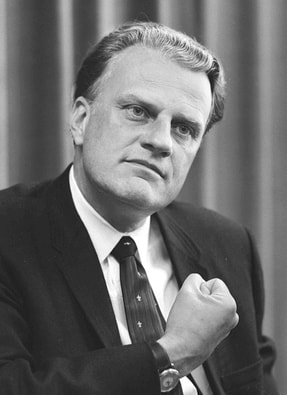|
My blog posts revolve around my interests and vocation as a historian: the intersection of history and contemporary church life, the intersection of history and contemporary politics, serendipitous discoveries in archives or on research trips, publications and research projects, upcoming conferences, and speaking engagements.
I sometimes blog for two other organizations, the Canadian Baptist Historical Society and the Centre for Post-Christendom Studies. The views expressed in these blogs represent the views of the authors, and not necessarily those of any organizations with which they are associated. |
|
https://commons.wikimedia.org/wiki/File:Billy_Graham_bw_photo,_April_11,_1966.jpg https://commons.wikimedia.org/wiki/File:Saint_Patrick_Catholic_Church_(Junction_City,_Ohio)_-_stained_glass,_Saint_Patrick_-_detail.jpg Recent moral failures of prominent Christian leaders have led to discussions surrounding the usefulness or wisdom of what is called the “Billy Graham Rule.” However, most are not aware of a virtually similar rule lived by another hugely successful itinerant evangelist roughly 1,500 years ago. His name was St. Patrick. The Billy Graham Rule has other names, such as the Modesto Manifesto, named after the location in California where it was first made between a young Graham and his associates in 1948.[1] More recently it has also been coined the Mike Pence Rule, after the former US Vice-President stated he tried to live up to it.[2]
Whatever you call it, it was a commitment made by Billy Graham to avoid being alone with any women other than his wife. The intent was obvious, with the avoidance of the appearance of moral compromise, or actual temptation, being at the heart of the rule. Other issues related to the rule was a commitment by Graham and his entourage to manage funds with integrity, to be honest with statistics, and to be irenic in dealings with others. The ultimate goal was to avoid the ever-present minefield of sins so common on the path of itinerant ministry. A reading of St. Patrick’s Confession indicates that he had a remarkably similar approach to avoiding sin and scandal in ministry. The dangers for him and his new flock were a clear and present danger, for, besides besmirching the name of the Lord, his opponents would look at any such transgressions as cause for persecution: “God knows I have not overreached any of them, nor do I think of it, because of God and his Church, lest I should excite persecution for them and all of us, and lest the name of the Lord should be blasphemed through me.” His plan was simple and straightforward – avoid the opportunity for and appearance of evil: “For though I am unskilled in names, I have endeavored to be careful even with my Christian brethren, and the virgins of Christ, and devout women, who freely give me gifts, and cast off their ornaments upon the altar, but I returned them, though they were offended with me because I did so. But I, for the hope of immortality, guarded myself cautiously in all things, so that they could not find me unfaithful, even in the smallest matter, so that unbelievers could not defame or detract from my ministry in the least.” St. Patrick went on to write how he did not take any money from the thousands of people he baptised, treated leaders he ordained graciously, and “labored freely and diligently in all things for your salvation.” The end result of such commitments was striking. St. Patrick’s ministry was stellar, devoid of scandal. As was Billy Graham's ministry. If the proverbial “proof is in the pudding” then leaders today would be wise to learn from such ancient – and modern – wisdom. [1] https://christianhistoryinstitute.org/magazine/article/the-modesto-manifesto/ [2] https://en.wikipedia.org/wiki/Billy_Graham_rule
2 Comments
Tim
3/16/2021 01:25:12 pm
Thanks for your emphasis on the need for integrity in ministry. It reminds me a talk Chris Wright gave called “Confronting Idols,” challenging the power, popularity, success, wealth, and geed often found in ministries.
Reply
Gord Heath
3/16/2021 01:56:51 pm
Thanks for. the comments Tim. A quick reply to questions that deserve more time (but I try to limit my blogs to no more than 800 words).
Reply
Leave a Reply. |
Archives
May 2024
|


 RSS Feed
RSS Feed
